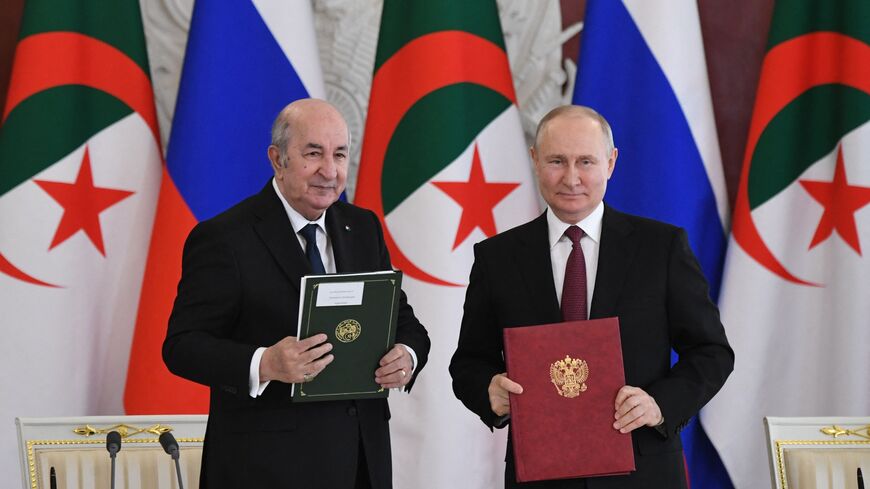On his visit to Moscow last week, Algerian President Abdelmadjid Tebboune and Russian President Vladimir Putin pledged to deepen their two countries’ “strategic partnership.”
Tebboune was invited to Moscow by his Russian counterpart, who is becoming increasingly isolated on the international stage over his decision to invade Ukraine in February 2022. Algeria has remained a steadfast ally of Moscow during this time, despite many countries shunning Russia over the war.
Amid sanctions by the West that prevent the direct buying of Russian exports, Moscow is turning its attention to Africa and Asia for new business, diplomatic and military opportunities — for example, increasing the presence of the mercenary Wagner Group in Central and North Africa.
Given that two of Algeria’s North African neighbors, Morocco and Tunisia, are generally more politically aligned with the United States than Russia, Algiers is seen by Moscow as an indispensable ally in the region.
Strong economic ties
"Algeria is a key partner for us in the Arab world and in Africa," Putin said after talks with Tebboune on Thursday, adding Russia wanted to strengthen energy and military ties.
The two countries’ economic ties are already strong. Algeria is Russia’s second largest trading partner in Africa, worth nearly $3 billion in 2021, according to official Algerian figures. Algeria is also the third biggest importer of Russian weapons in the world, and Russian weapons and military systems constitute more than 50% of Algeria’s arsenal.
"Algeria's economic benefits from maintaining close ties with Russia amid the Ukraine war include increased imports of wheat and soybean oil from Russia," Alissa Pavia, North Africa associate director at Atlantic Council told Al-Monitor. "Although Algeria can easily source these products from Europe, its continued importation from Russia serves as a message that Algeria's relationship with Russia remains strong."
She added that given Algeria's reliance on wheat and other agricultural products, it is likely that the two countries will explore economic partnership agreements that favor Russian exports of agribusiness products to Algeria.
Caught between a rock and a hard place
Tebboune’s Russia visit has not gone without criticism. Some Algerian media believe that there will be ramifications for the country due to the president’s “uncalculated” trip to Moscow, the New Arab reported Thursday. Europe and the United States have also criticized Algeria for staying close to Russia during its war against Ukraine. Still, Algiers has kept mainly cordial ties with much of Europe given its role as an alternative source of gas and oil to Russia, which is sanctioned by the European Union.
Grant Rumley, Goldberger Fellow at the Washington Institute for Near East Policy, told Al-Monitor that Russia’s invasion of Ukraine has put Algeria in a tough spot. The Algerian military is reliant on continued Russian support to keep its platforms operational, but at the same time, the demand for Russian weaponry is drying up so Moscow will want to maintain warm relations too.
“Tebboune’s trip will almost certainly touch on the status of this reportedly massive defense deal,” Rumley said.
Last November, state-owned RT network reported that Algeria was set to sign a huge contract with Russia to get $12-17 billion worth of Russian arms supplies, including Sukhoi stealth aircraft, bombers and fighters. That deal has not yet been announced, but it is thought to still be in the cards.
Staying loyal to Moscow
“Whether or not Russia is able to actually proceed with the sale or offer competitive equipment remains to be seen,” Rumley added. “I think Algeria will likely try to use its status as a reliable arms purchaser as leverage in the negotiations for more advanced Russian weaponry, or as a way to arrange alternative payment methods (like bartering) for the deal, but I’d imagine some Algerian officials are wondering if it might be safer to begin diversifying arms purchases away from Moscow in the long run.”
Pavia said that Algeria is confronted with the choice between continuing to purchase Russian weapons or exploring alternative suppliers such as China, Germany and Italy. "However, given the strong ties between the two countries and their strategic cooperation in the global energy market, it is unlikely that Tebboune will seek to procure arms from elsewhere.
But Rumley said that Algiers has also shown a willingness to take advantage of Russia’s invasion of Ukraine to advance its own interests — such as the rise in Algerian energy exports to Italy, a long-time Russian customer. If it does not achieve its strategic aims with Russia, Algeria may use this moment to begin shopping elsewhere, Rumley said.
Pavia warned that if Algiers continues its strong association with its historical partner, it may end up backfiring.
"In the long run, if Russia's ongoing invasion of Ukraine continues to weaken the Kremlin, as is presently the case, Algeria may also experience a decline in its own strength," she said.
Algeria aligning with Russia at this time could lead to further alienation from Western and American allies who will be more hesitant to trust and strengthen ties with Algiers in the future, she said.
"Additionally, if there is a decrease in reliance on hydrocarbons over the next 10 to 15 years, Western countries will have fewer reasons to maintain their relationship with Algeria, potentially isolating Algiers further," Pavia added.








